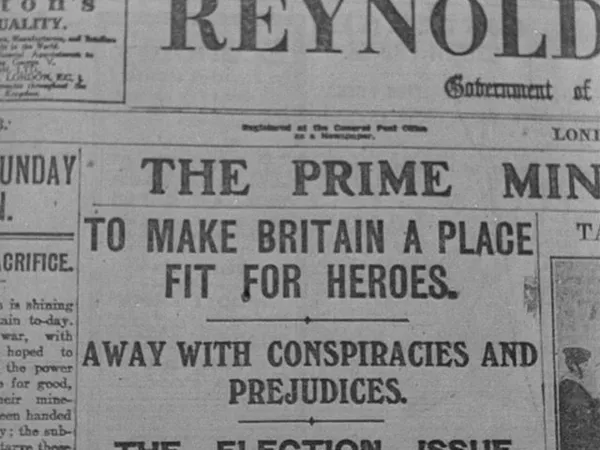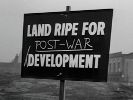Eye For Film >> Movies >> Land Of Promise (1946) Film Review
Land Of Promise
Reviewed by: Rebecca Naughten

Tapping into the buoyant mood and apparent desire for a more egalitarian society in the immediate aftermath of the Second World War, Land Of Promise is an unabashedly socialist rallying cry - "Now's our chance!" - to solve the housing crisis that had blighted lives for decades despite government lip service to the issue after the previous war. The central argument is that if the country can pull together in the name of national interest during the conflict it should be able to collectively address the problem of housing that is inadequate in terms of habitation standards, and unable to match demand or affordability.
Divided into three parts - Homes As They Were, Homes As They Are, and Homes As They Might Be - the film uses a multi-voice narration wherein the different voices argue over evidence and question the official version of events. The central voice is that of an Everyman (John Mills), who takes on the blustering Know-All (Miles Malleson), voice of conservative Middle England, with recourse to History (Herbert Lomas), Hansard (Henry Hallat), the Observer (effectively statistical information presented in a visual format and given voice by Frederick Allen) and 'The Woman' (Elizabeth Cowell), to develop an argument for his belief that this issue should have been dealt with years ago, and to formulate a plan for what to do next.

Effectively the voices represent different ideological standpoints but the evidence that they present as Mills' character tries to enlighten and educate Malleson's coalesces around an acknowledgement that something has gone very wrong and must be acted upon.
A detailed social history lesson and a history of housing development and policy in Britain, the script is also surprisingly willing (given the era) to criticise successive governments for their inaction and/or counterproductive behaviour - and crucially for the lack of centralised planning or standards in relation to housing that was built between the wars. If the intention was partly to persuade the section of society - embodied by Know-All - who had simply refused to acknowledge that some of their fellow citizens lived in dire circumstances through no fault of their own, of the need for collective action, the film nonetheless refuses to soften its view of the "narrow stupid selfishness" at the base of such wilful human obstruction.
The war shone a spotlight on the problem in unexpected ways - evacuation revealed the poor health and nutrition of children from the slums, the fitness of adults from poverty-stricken areas had to be acknowledged in relation to their fitness for National Service, and bombed out housing offered the opportunity to rethink what was built - but also created the centralised organisational methods and planning that would be required for a proper solution. Paul Rotha's film is impressively rounded and researched in how it considers multiple perspectives and interrelating elements of infrastructure, economy and commerce - it is a campaigning film that goes well beyond the surface of an issue and you are left with the feeling that this was a cause that the director truly believed in.
Land Of Promise builds up momentum through its editing in the final stretch and the accumulated evidence that has been offered. This culminates in Mills' disembodied voice gaining corporeal form as he steps before the camera to break the fourth wall and deliver an impassioned call to arms for the audience - "the only real wealth of a country is the health and happiness and freedom of its people. Who dares to estimate the money value of children killed by poor food and bad housing? Who dares to put a price on the million people killed by bad housing between the two wars? The old-fashioned way of reckoning human wellbeing in terms of profits... I tell you that way of thinking has got to be eliminated, liquidated, mopped up, wiped out!..."
It's gloriously punch-the-air stuff (albeit in a form of patriotism that is now unfashionable) until you remember that the arguments he's making - that people should come before profit, that the government must take responsibility for living standards and that MPs and Ministries should be held to account because they are put there by us, to represent us, the common people - are still relevant and still being fought over some 70 years later in the Britain of 2016. Recommended.
Reviewed on: 19 Feb 2016
















